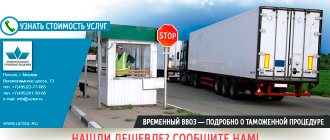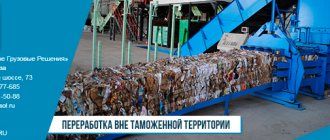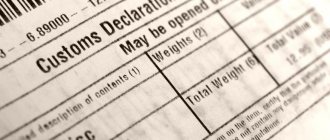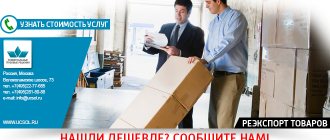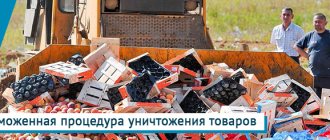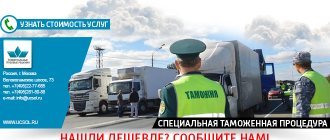HomeCustoms clearanceCustoms procedures Processing for domestic consumption
The customs procedure of processing for domestic consumption is a customs procedure (formerly the customs regime), according to which goods intended for placement under the release procedure for domestic consumption are manufactured from foreign goods on the territory of the EAEU within a specified period. The resulting product can be used in any EAEU country without restrictions. In this case, import customs duties are not paid, and only customs duties and VAT are payable, and all non-tariff control measures, prohibitions and restrictions must be taken into account. The resulting product is subject to import duty.
The customs procedure code for processing for domestic consumption (import) is IM91, which is indicated when filling out column 1 of the customs declaration by a legal entity or individual entrepreneur.
Column 1 consists of three cells and is filled out as follows:
|
More details about filling
Features of the processing procedure for domestic consumption
Not all goods can be placed under the customs procedure of processing for domestic consumption, but only those approved by law. This procedure can be completed by placement under IM40. The result is a new product that can be freely used in the territory of the EAEU member countries. As a result of the technical process, waste, residues, and production losses may appear.
| To processing operations for domestic consumption | |
| Relate: | Cannot be attributed: |
| Processing of goods leading to changes in characteristics and properties | Pre-sale preparation, actions to ensure the safety of goods |
| Manufacturing of goods | Growing and breeding: animals, birds, fish, molluscs and crustaceans |
| Repair of goods, including replacement of spare parts | Growing trees, crop production |
| Use as raw material, when combined with other operations | Copying information, including audio and video recordings |
| Use of goods as an aid in technical processes | |
Do you need a processing procedure for internal consumption? - We will help you!
Rules and features of processing processing for domestic consumption
Individuals cannot use this processing procedure for domestic consumption.
A legal entity or individual entrepreneur , placing goods under the processing procedure for domestic consumption, provided that they have documents with a detailed description of the conditions of this operation, its timing, the resulting goods, waste and other details. In this case, other accompanying documents for the goods may also be required. When placed under the procedure: no duty is paid, but VAT and customs duties are paid, non-tariff control measures, prohibitions and restrictions must be observed. The resulting product is subject to import duty.
Who should not be involved in recycling?
Articles 97, 99 and 101 of the Labor Code of the Russian Federation give an idea of the restrictions regarding involvement in processing. The following categories of workers cannot be involved in SR:
- Pregnant women.
- Minors.
- Persons combining work and study.
Some employees need to be informed, against signature, of their right to refuse management’s demands:
- Disabled people.
- Mothers of children under 3 years old.
- Single mothers and fathers.
- Guardians of minors.
The involvement of these employees in processing must necessarily be accompanied by obtaining written consent from them.
Conditions for placing goods under the procedure
To be placed under the procedure:
- It is necessary to obtain a document on the conditions for processing in the customs territory, which contains all the necessary information specified by the EAEU Customs Code. It can be issued to any interested person who is a resident of the EAEU member country in which processing is intended to be carried out. The document must indicate the processing time for the goods.
- It is necessary to be able to unambiguously identify imported goods in processed products. For this purpose, the following are used: seals, stamps, markings, including digital ones;
- photographs, detailed descriptions, images;
- comparison of samples or specimens;
- use of existing markings or applied serial numbers.
Example of processing for domestic consumption
Goods F and placed under the processing procedure for domestic consumption.
When importing, VAT and excise duty are paid; import customs duties for goods are not paid. You need to pay customs duty for goods P (processed product).
Excise-free goods
The weight of imported goods is 5000 kg.
Customs value of goods is 1 million rubles.
Processing rate: from 1 kg of product F you will get 0.9 kg of product P
For goods F, the import duty rate is 2 euros/kg, the VAT rate is 20%
For goods P, the import duty rate is 0.5 euro/kg, the VAT rate is 20%
Calculation
Product weight P :
5000 kg X 0.9 = 4500 kg
Conventionally calculated customs duty for the import of goods F :
5000 kg X 2 euro/kg X 80 rub. = 800,000 rub.
VAT : (1 million rubles + 0.8 million rubles) X 0.2 = 360,000 rubles.
Import customs duty for goods P (processed product):
4500 kg X 0.5 euro/kg X 80 rub. = 180,000 rub.
Result
When placed under the processing procedure for internal consumption, you must pay VAT in the amount of 360,000 rubles. and Import customs duty in the amount of 180,000 rubles.
The purpose of applying the procedure is to minimize customs duties, create and support the processing industry. This is achieved by the difference in the rates of import customs duties on raw materials and on products made from them.
What is recycling?
First, let’s look at what does not belong to the concept of “recycling” to avoid confusion. According to Article 97 of the Labor Code of the Russian Federation, there are two types of labor organization: irregular working hours and overtime work. If an employee carries out his activities according to the first scheme, the concept of processing will not apply to him. This rule is also set out in a letter from Rostrud dated June 7, 2008. That is, if an employee with irregular working hours is late in the evening, he is not entitled to any additional payments for this. Compensation for overtime is provided by additional vacation days.
Another case when work beyond the schedule is not paid additionally: the employee decided, on his own initiative, to stay in the office in order to complete tasks that were not completed on time. This is relevant if a worker is given a task and adequate deadlines to complete it, but he does not have time. The lack of compensation in this case is regulated by a letter from Rostrud dated March 18, 2008.
ATTENTION! The above rule does not give the employer the right to artificially create conditions in which the employee does not have time to solve the problem. For example, if a manager gives a task that requires 5 hours to complete, an hour before the end of the shift, this will be considered an abuse of the law.
All other work in excess of the established standards, according to Article 99 of the Labor Code of the Russian Federation, relates to processing and is compensated. Overtime hours must be taken into account.
The legislative framework
The concept of overtime work is closely related to working time standards. According to Part 2 of Article 91 of the Labor Code of the Russian Federation, the length of the work week should not exceed 40 hours. For some specialists (according to Articles 92, 173, 174, 333 of the Labor Code of the Russian Federation), a shortened working week is relevant. Every week, the employee must be provided with uninterrupted rest of a minimum duration of 42 hours (Article 110 of the Labor Code of the Russian Federation).
Anything that goes beyond the specified standards is recycled. Article 99 of the Labor Code of the Russian Federation sets out the conditions for engaging in overtime work:
- There is an emergency or a threat to property in the company (other reasons for engaging in overtime work are also allowed).
- The employee agreed to overtime (this is a mandatory condition for disabled people and young mothers).
Even overtime has its limits. In particular, the total duration of processing should not exceed 120 hours per year and 4 hours over a continuous two days. The employee’s work must be compensated at one and a half or double rates. The specifics of payments are regulated by Article 152 of the Labor Code of the Russian Federation.
ATTENTION! For some types of work (for example, on shifts), it is impossible to ensure a standard working day. In this case, the actual number of working hours is checked against quarterly or monthly standards (according to Article 104 of the Labor Code of the Russian Federation). In this case, the employer needs to issue a local act indicating the working time schedule, and also include the corresponding clause in employment contracts with employees. Overtime will be labor in excess of the standards established by the internal regulations of the enterprise.
Processing time for goods for domestic consumption
When completing the procedure, the period for processing goods for domestic consumption must be indicated, which cannot exceed 1 year. It consists of the time allotted for processing the goods and the time it takes to place them under the release procedure for domestic consumption. It is important to remember that you must meet the specified deadline, or it will have to be extended. The legislation allows for the extension of this procedure if no more than 10 days have passed since the end of the established period.
Registration procedure
When processing processing, you can use the following algorithm:
- Obtaining consent in writing . It is advisable to obtain it before issuing an order on overtime work, since the worker may well refuse the manager. In this case, if the order has already been drawn up, you will have to edit it. How to obtain consent? To do this, you can write a notice that sets out the duration of the overtime work, as well as the start date. You can also prescribe forms of compensation for overtime to choose from - money or additional vacation days.
- Making an order . Its form is not established by law, and therefore the document is drawn up in free form. The document indicates the reason for overtime, the full name of the employees, and the start and end time of overtime service. It is advisable to refer to notices in which the consent of employees is given.
- Familiarization by the employee with the order . Each person involved in processing puts his signature.
- Entering data into the accounting sheet . In this case, according to Goskomstat Resolution No. 1, forms No. T-12 or T-13, codes “C” and “04” are used. It is imperative to record the exact number of hours that the employee worked overtime.
IMPORTANT! The information indicated in the time sheet must be similar to the information set out in the order on overtime service.
Registration of the customs procedure for processing cargo and goods for domestic consumption
Ours is a customs representative - broker and carries out prompt clearance of the customs procedure for processing for domestic consumption of any cargo and goods provided for by law at any customs offices of the Russian Federation:
- At airports
- In seaports
- At railway stations
- At cargo automobile terminals – temporary storage warehouse
- Express postal items
If necessary, we carry out customs clearance of goods in any other customs procedures!
We work with any participants in foreign trade activities:
- Individuals
- Legal entities
- Individual entrepreneurs
We carry out declaration of goods on the basis of a concluded brokerage agreement and a certificate of inclusion in the register of customs representatives. We bear full responsibility to the client and customs.
We will help you declare goods under the processing procedure for domestic consumption!
Documents and information for processing the processing procedure for domestic consumption
Our company’s specialists provide assistance in preparing documents and registration - placing them under procedure for internal consumption. Our employees are ready to advise clients on what documents will be required in each specific case.
Documents and information for registration of goods and cargo under the processing procedure for domestic consumption (IM 91)
- List of documents for registration of a Legal entity at customs (View)
- List of documents for registration of an individual entrepreneur at customs (View)
- List of documents for registration of the processing procedure for internal consumption (View)
Time frames and cost of completing the customs procedure for processing for domestic consumption
The processing time for internal consumption is 1 day!
At the same time, the price or cost of clearance - placing goods under the customs procedure for processing for domestic consumption in our company is the minimum in the market and depends on the place of customs clearance, the participant in foreign trade activities, the client’s tasks, the quantity and volume of goods processed and many other factors and on average can be For:
- Legal entity or individual entrepreneur - 10,000 - 22,500 rubles.
We are ready to become a reliable partner at customs!
When is refusal to recycle allowed?
As a rule, overtime work is voluntary. If an employee refuses it, the manager does not have the right to apply sanctions to him. However, there are exceptions. Under certain circumstances, an employee is required to come to work:
- There is an emergency in the company, or if processing is needed to prevent a disaster.
- Restoration of life support systems for the population (gas, water, etc.).
- Execution of work related to the introduction of martial law.
- Work related to preventing or eliminating the consequences of situations that pose a threat to the lives of the population.
Legislators respect the personal will of the worker, but it should not endanger the lives of other people.


